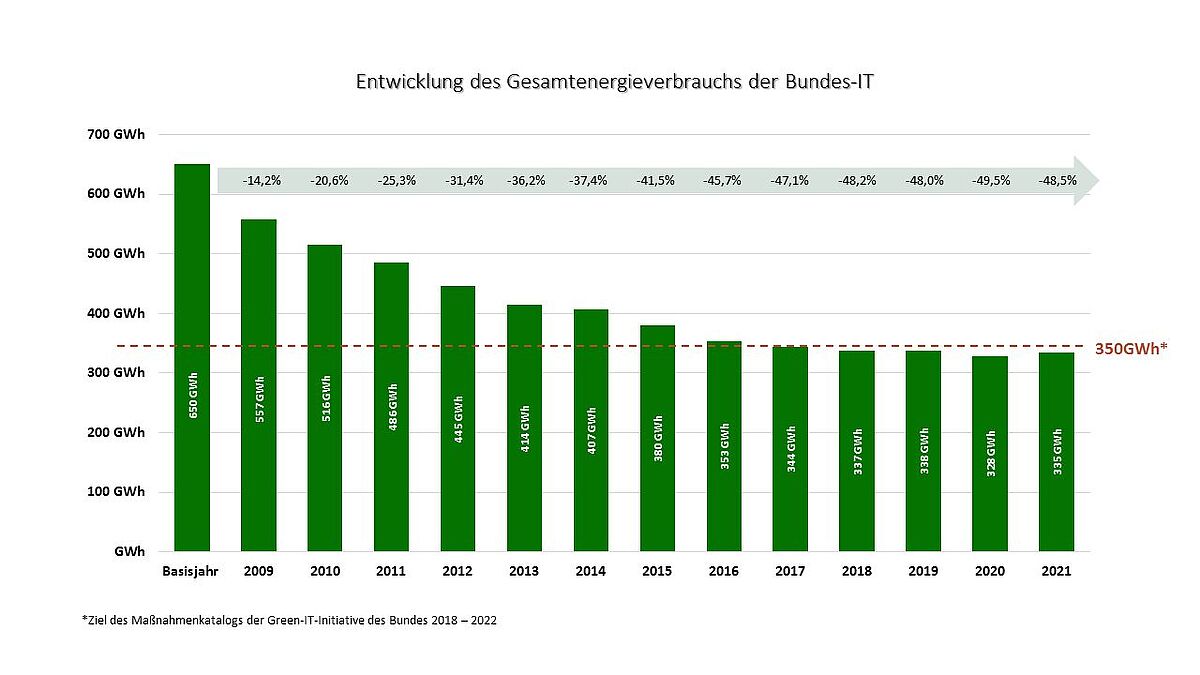 World Bank 2023
World Bank 2023
Germany’s ongoing digital transition offers significant potential to improve core public administration processes, public services, and civic engagement. However, rapid digitalization of public sector administrations also involves changing demands and use of inputs. Studies forecast continuous increases in energy consumption by the ICT sector in general, including in the public sector, a trend that is driven, for instance, by a growing demand for data-center capacities, artificial intelligence, blockchains, video streaming, and shorter ICT product cycles.
Recognizing this, the German government launched its Green IT Initiative in 2008—one of the first of its kind—for the federal administration to reduce energy consumption and greenhouse gas emissions. This initiative was recently extended until 2027. In this blog, we look back at its key achievements, from 2008 till now, and highlight key objectives for its future.
The annual energy consumption of the whole ICT sector in Germany was 59.8 TWh (terawatt hours) in 2020. The government estimates that the use of new technologies such as blockchain, cloud computing, and 5G will increase electricity consumption and emissions if not mitigated early on. This is why the government is aiming to design and operate its own IT infrastructure so as to contribute to climate protection. The federal government is convinced that if used correctly, digitization can help to reduce operating energy and the use of natural resources.
The Green IT Initiative set the following three objectives in 2008, which are regularly readjusted:
- Even with further performance improvements, energy consumption caused by IT operations should not exceed 350 GWh/year.
- Sustainable IT procurement (also meaning green) of IT hardware and services is to be implemented.
- All major new IT investments must consider energy consumption over the planned operating life as an important procurement criterion.
As part of its operations, the Green IT Initiative set up a system of regular monitoring and reporting and the results are quite dramatic:
- From the start of the initiative, energy consumption has fallen by around 49 percent from 649.65 GWh in 2008, to 334.54 GWh in 2021.
- This reduced consumption resulted in budgetary savings of €546 millions
 Total energy consumption by Federal IT—2008-2021
Total energy consumption by Federal IT—2008-2021
Based on the success and challenges experienced by the initiative, the Federal administration revised its objectives for the new extended phase from 2022 to 2027:
- Main data centers (greater than 100kW IT load) owned by the government should meet the criteria for energy-efficient data centers issued by the ecolabel of the German federal government (“Blue Angel”) | The German Ecolabel (blauer-engel.de).
- Consistent procurement and use of the most environmentally friendly IT products and IT services that meet the needs of users.
- Inclusion and consideration of qualitative aspects of greening IT by updating the quantitative reporting system.
Looking forward, the German government sees substantial potential greening data centers and public procurement, which aligns with the thinking of many international experts and the World Bank. The government is also placing emphasis on setting up quantitative and qualitative measuring systems, which can closely monitor and manage the implementation of the Green IT Initiative in the public sector.
Data from the initiative shows that a commitment to design a green public sector digitalization process can be effective and sustainable even while expending and deepening the use of IT in the public sector. Important elements are a firm political commitment, clear objectives, along with solid management and reporting structures. This finding is in line with the forthcoming policy note of the World Bank on Greening GovTech. Further cooperation between Germany and the World Bank’s GovTech Global Partnership is envisioned and under discussion, especially regarding effective solutions to green GovTech and to measure GovTech contributions to tackle climate change.
Related Blogs
Five green digital solutions to reduce GovTech energy consumption



Join the Conversation